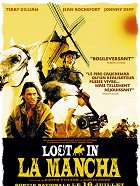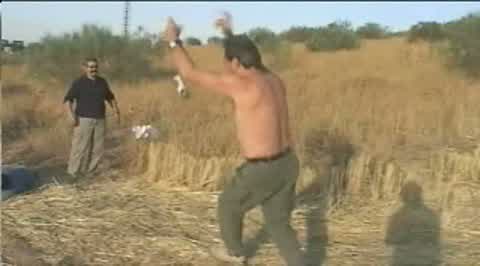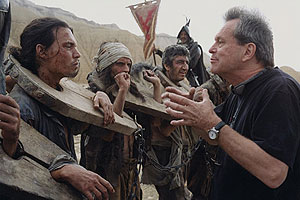Photographie:
Louis PepeMusique:
Miriam CutlerActeurs·trices:
Tony Grisoni, Terry Gilliam, Jean Rochefort, Johnny Depp, Vanessa Paradis, Christopher Eccleston, Bill Paterson, Miranda Richardson (plus)Résumés(1)
Le cinéaste TERRY GILLIAM se mesure à son alter ego, DON QUICHOTTE, dans ce documentaire sur la "non-réalisation" d'une superproduction LOST IN LA MANCHA est probablement le premier film documentaire sur la "non-réalisation" d'un film: au lieu de présenter un aperçu édulcoré des coulisses du tournage, LOST IN LA MANCHA aborde de manière inédite la dure réalité de la réalisation. Témoin de conflits personnels comme de tempêtes mémorables, c'est un document unique sur le naufrage d'un film. Madrid, été 2000: Terry Gilliam, cinéaste visionnaire, se prépare à tourner L'HOMME QUI TUA DON QUICHOTTE, une version très personnelle de l'œuvre de Miguel de Cervantès, avec Jean Rochefort, Johnny Depp et Vanessa Paradis dans les rôles principaux. Malgré des conditions de production chaotiques, GILLIAM reste très enthousiaste. Après dix ans de combat acharné, il est sur le point de réaliser son rêve. En rejoignant l'équipe de production, basée à Madrid, huit semaines avant le début du tournage, les réalisateurs de LOST IN LA MANCHA, Keith Fulton et Louis Pepe ne savent pas encore ce qui les attend. Pourtant, les problèmes ne tardent pas à arriver: les membres de l'équipe, multilingue, rencontrent des difficultés à exprimer leurs idées ; les acteurs, ayant pris du retard sur leurs autres projets, se font désirer ; et d'autres impondérables tels que des chevaux mal dressés et un plateau mal insonorisé compromettent déjà le tournage. Toutefois, on ressent un enthousiasme palpable et grandissant car le projet de GILLIAM va enfin se concrétiser: l'équipe visionne les bouts d'essais des géants maraudeurs, les marionnettistes s'entraînent à manipuler une armée de pantins grandeur nature, GILLIAM et Johnny Depp peaufinent le scénario. Et lorsque Jean Rochefort enfile l'armure de Don Quichotte, tout semble aller pour le mieux, a priori. Mais le tournage à peine commencé, les catastrophes s'enchaînent... (Haut et Court)
(plus)Vidéo (1)
Critiques (5)
It’s a mix of fascination with sadness. Fascination with an extremely creative personality, as Gilliam undoubtedly is, a filmmaker who is always several steps ahead thanks to his imagination. Fascination with the fierce struggle against adversity, the mediocrity of a world that does not understand him and the producer's mistakes. A struggle that, given the predetermined outcome, may resemble Don Quixote's foolish confrontation with the windmills. And the sadness? This stems from the fact that rich imagination full of fantasy can go to waste with the author losing a lot of energy and time in a futile and useless struggle that cannot be won. Filmmaking is a trade, and Don Quixote is probably a cursed material that has already broken many filmmakers.
()
Terrible. A certain amount of uncertainty and doubt can be observed in Gilliam's filmmaking in almost every film he makes... but this quixotic sequence of hardship surpasses every imaginable windmill to contend with. A film that became a reality... Sensitively shot, gripping...
()
In the “Gilliamesque" memoir, Terry Gilliam writes: “What the camera didn't capture was buzzards. They were circling over our heads waiting for us to die." When I saw Lost in La Mancha for the first time ages ago, I still didn't know much about Gilliam, and I had no idea how (difficult) his other films were to make, but still the result impressed me. Today, now that I'm more familiar with them, plus the day before I see a film that finally came into existence, this disaster documentary is even more impressive. It's a shame it all went so horribly wrong back then, mainly because of Jean Rochefort, but there’s nothing that can be done about that. The windmills simply won for once.
()
A documentary that leaves you feeling incredibly of powerless and hopeless. Financially underestimated projects always have problems and The Man who Killed Don Quixote was a movie hounded by budget compromises from the very start. The few scenes that they were able to film look very promising and watching them with retrospect with the director is mentally painful. After the flood a bad taste of mud, exhaustion remains and you are left at the mercy of the claims adjuster. All of these feelings endure even with the knowledge that Gilliam managed to get his screenplay back and a new version of the movie is playing in some theaters right now.
()
Terry Gilliam tilting at windmills. It is incredible what can happen on set in the course of one week. The leading actor falling ill is just the tip of the iceberg in a series of disasters. This is possibly the only completely honest documentary about a movie that was never made. Proof that Gilliam is a genius visionary, but a bad manager - which is most painfully clear in the scene where he can’t pluck up the courage to come out with the unpleasant truth in front of the crew. The beginning of the end of Don Quixote was evident in the non-existent pre-production. Just a couple of days before filming was meant to begin, contracts still remained to be signed, equipment to be bought and nobody knew what precisely they were going to do. I understand that directors normally have people to organize all that, but here Gilliam concentrates only on his dream and won’t admit even to himself that he has serious problems. A hugely fascinating, yet sad documentary that at first was meant to be “The Making of The Man Who Killed Don Quixote", but as time went on it becomes incredibly revealing insight.
()



Annonces